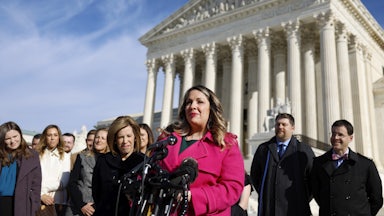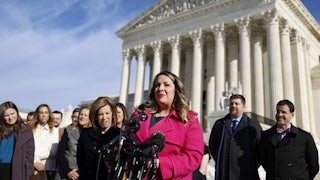It’s been a little more than a week since we reported on an inquiry purporting to be from a gay couple to a web designer who, seeking to deny service to same-sex couples, brought a case to the Supreme Court. Both the plaintiff in the 303 Creative v. Elenis case, Lorie Smith, and her attorneys, the Christian nationalist law project Alliance Defending Freedom, or ADF, had for years claimed this request seeking a wedding website was genuine. In a 10-minute phone call I made last week to a straight man who had no idea his contact information was being used in a Supreme Court case about gay wedding websites, their story unraveled.
The inauthentic inquiry came to light the day before the justices of the Supreme Court issued a 6–3 opinion in favor of Smith. Since we published the story, the curious existence of the fake wedding website request has only amplified calls for investigations and accountability and questions about the legitimacy of the court.
“Faux litigation takes a new step into fakery in a Supreme Court case,” Senator Sheldon Whitehouse tweeted the day the decision was handed down; Whitehouse has argued in the past that Congress has the power to subject the court to ethics reform. On MSNBC, former acting Solicitor General Neal Katyal suggested there may be a pathway for the Supreme Court to rehear the case.
“This is potential fraud on the Court,” Sherrilyn Ifill, senior fellow at the Ford Foundation and former president of the NAACP Legal Defense Fund, commented on Twitter. “It warrants investigation, potential vacatur & disciplinary proceedings.” But there are other systemic issues, as Ifill also pointed out, in that what we are seeing is “a consequence of the Court’s apparent zeal to hear this case which did not meet standing even w/o fraud.”
But long before I made that call, 303 Creative was already being referred to as a “same-sex wedding website case” in which there was neither a same-sex wedding nor a wedding website. The illegitimate inquiry we discovered is simply the most concrete example of a lack of real conflict in the 303 Creative saga—not a linchpin upon which to reconsider the entire case. Focusing too much on our (admittedly dramatic) discovery risks missing the larger point: that this case was a weapon utilized by the Christian right, built on decades of legal preparation, to use the courts to allow rampant and open discrimination against groups it wishes to target.
We still do not know what action the courts and disciplinary bodies may take in the aftermath of this unfavorable information coming to light. We still don’t know who submitted the fake inquiry. But those who introduced the inquiry into the case, Smith’s lawyers at Alliance Defending Freedom, have taken steps to distance themselves from it. Last Thursday, the day the inquiry was first reported on in The New Republic, ADF senior counsel Kellie Fiedorek posted a Twitter thread in which she claimed our reporting was intended to “malign” their client and “smacks of desperation to delegitimize her civil rights case and our judicial system.” On Monday, ADF senior counsel Kristen Waggoner—who was part of the team representing 303 Creative—alleged that a “wave of misinformation” had been “ignited” by the story. This was after our reporting was confirmed in stories from The Guardian, CNN, the Associated Press, and The Washington Post, among others.
In the days since their court victory, ADF has stuck to the line that the fake website inquiry was “irrelevant,” since its case was a pre-enforcement challenge. On that point, ADF is at least partially correct: The case did not begin with a genuine request for services, nor with Lorie Smith refusing to provide them. ADF’s original complaint in the case, filed September 20, 2016, alleged that Smith would have risked violating a Colorado anti-discrimination ordinance if she had posted anything on her website about her refusal to serve customers seeking design services for same-sex weddings. Per ADF, she was therefore entitled to challenge the law before it was actually used against her.
ADF’s argument once we reported on the fake request, however, was that it doesn’t matter “whether Lorie received a legitimate request or whether someone lied to her.” Yet throughout the years of court filings, Smith and ADF consistently presented the inquiry as both legitimate and relevant.
In a motion for summary judgment filed on February 1, 2017, in their case before the United States District Court in Colorado, ADF claimed that “despite not being in the wedding industry, Lorie has received a request to provide custom graphic and website design services for a same-sex wedding ceremony,” citing a sworn affidavit from Smith, in which Smith wrote that she “received a request through the ‘contact’ webpage on my website” to design collateral “for a same-sex wedding.” After citing Smith in its motion, ADF added, “If she were in the wedding industry, this request would place Lorie in the impossible situation she seeks to avoid by filing this lawsuit.”
Had ADF’s lawyers contacted the person whose information was contained in the inquiry—and that person says they did not—they would have been able to determine if that request was fake. They would have discovered that it was not an inquiry that would have ever led to putting Smith in the “impossible situation” of turning down a same-sex wedding website client—because there was no same-sex wedding client to turn down.
Even before our reporting, 303 Creative was already raising legitimacy questions. Many experts argued that the case should never have made it as far as it did. “Federal courts are not in the business of deciding hypothetical cases,” Ian Millhiser wrote at Vox last December. “If, at some point in the future, a customer asks Smith to design a particular website, she refuses, and then Colorado attempts to sanction her for that refusal, then she may very well have a valid First Amendment claim. But it is impossible for the Supreme Court to determine whether this hypothetical chain of events might play out in the future.”
But this purely hypothetical case was brought to this court, where, as legal journalist Chris Geidner noted, the conservative justices had spent the past year sending the message that “facts and precedent (and what lawyers say, apparently) don’t matter and won’t stand in the way of their ideological, extremist ends.” The hypothetical bent of Smith’s complaint, the make-up of the Roberts court, and “the radical nature of ADF’s true goal,” as Slate’s Mark Joseph Stern observed after oral argument in the case, all pointed to one fact: This was a case designed to protect discrimination. It was an exercise to get the court to rubber-stamp the Christian right’s claims that when a business refused to serve queer people as it would serve straight people, that wasn’t unlawful conduct, but free speech.
Back in 2007, the investigative journalist Sarah Posner traced those who helped build the law project that became Alliance Defending Freedom, which was founded in the early 1990s (the decade in which Justice Clarence Thomas was appointed to the court and in which Justices Amy Coney Barrett, Neil Gorsuch, and Brett Kavanaugh graduated from law school). The idea, as explicitly stated by founder Alan Sears, was to save America from the ungodly transgressions of the American Civil Liberties Union, and on their turf—the courts. Since the group’s inception, it has trained a “legal army”—nearly 5,000 lawyers, according to ADF—who pledge to do pro bono work for the group “on behalf of the body of Christ.”
“ADF’s reputation—and fund-raising spigot—preceded its first court case,” Posner wrote. Donors to ADF over the years have included the Servant Foundation—of the Super Bowl “Jesus” ad—which gave more than $50 million between 2018 and 2020, the Richard and Helen DeVos Foundation (which was started by the in-laws of former Trump Education Secretary Betsy DeVos), and other influential Christian right figures. According to its most recent IRS 990 filing, in the fiscal year ending in June 2021 alone, ADF took in $76 million in contributions and grants. With this considerable funding, ADF has, in turn, donated millions of dollars to cover legal expenses for various Christian plaintiffs and defendants, with, the group claims, “40+ Supreme Court victories.”
Over the course of a decade, as Posner put it, “ADF has created a zeitgeist of Christian victimhood.” The group’s assumed martyrdom is evident in the full range of its legal battles, from helping states draft and then defend anti-abortion laws in its successful effort to overturn Roe v. Wade, to its former president’s contributions to a baseless, failed lawsuit meant to overturn the 2020 presidential election. As part of forwarding this narrative of Christian victimhood, ADF has also helped create sympathetic characters around the Christians it represents—such as Lorie Smith.
The story that ADF wants to tell now is a return to victimhood. From its public comments, that narrative appears to be that Smith was forbidden from checking the inquiry out because she did not want to be forced to break the law. “Lorie has received other wedding requests and can’t respond to any of these, regardless of who asks, because that puts her at risk of punishment for violating CO’s unjust law,” ADF’s Fiedorek tweeted. What this response ignores is the inconvenient fact that it was in ADF’s favor never to actually check out the inquiry to determine if it was in good faith. Is it genuine, is it not? If you don’t make the effort to actually find out, then the inquiry can always have been maybe genuine. ADF, in other words, is inviting us to Schrödinger’s gay wedding.
Decisions like 303 Creative further expose the power and influence that the right wields on the court. Groups like Alliance Defending Freedom are merely one in a network that has spent decades building, justifying, staffing, and training—and giving highly questionable perks to—the court as it is today. Even if, on an incredibly rare chance, the court agrees to rehear the 303 Creative case, if we are to reach something like accountability for our justice system, we must reckon with “a principle of high folly in American politics,” as Keeanga-Yamahtta Taylor argued in 2020, “the insistence that the Supreme Court is not a political body.” In their own way, Smith’s attorneys at ADF have weaponized the illusion that the court operates outside politics. And, as their response to the exposure of this inquiry has shown, they don’t seem to want others to realize that it doesn’t.










